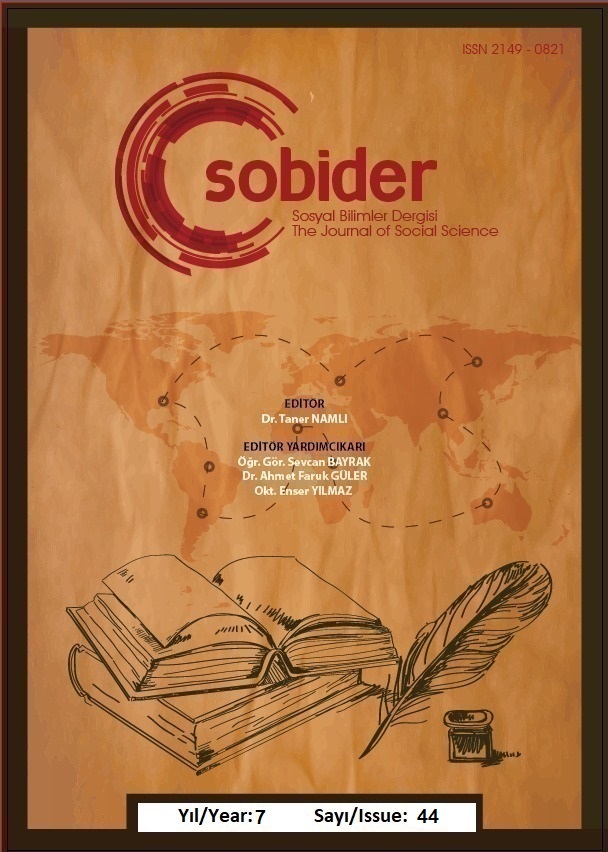İRAN REHİNE KRİZİ SÜRECİNDE JİMMY CARTER VE AYETULLAH HUMEYNİ’NİN LİDERLİK TARZLARININ KARŞILAŞTIRILMASI
Author :
Abstract
Bu çalışma, Jimmy Carter ile Ayetullah Humeyni’nin liderlik tarzlarını İran rehine krizi sürecindeki bir “karar gerektiren duruma” dayanarak kıyaslayacaktır. Çalışmanın birinci bölümünde, krize giden süreçteki ortam kısaca resmedilecektir. Takip eden bölümde, İran’ın ve Amerika Birleşik Devletleri’nin krize yönelik tepkisi, ABD’nin krizi sona erdirmek için giriştiği kurtarma operasyonu, operasyon kararının nasıl alındığı ve neden başarısızlıkla sonuçlandığı gösterilecektir. Son olarak, kriz esnasındaki karar alma süreci Carter ve Humeyni’nin her biri için bir “karar gerektiren duruma” odaklanarak incelenecektir.
Keywords
Abstract
This paper aims at making a comparison between the leadership styles of Jimmy Carter and Ayatollah Khomeini based on “one occasion for decision” during the Iran hostage crisis. In the first part, the atmosphere led to the crisis will be touched upon briefly. In the second part, more efforts will be devoted to the initial response of Iran and U.S. to the crisis. In addition to this, failed rescue attempt by the US, the reasons to take such an action, and the reasons of failure of the operation will be examined briefly. In the final part, decision making in the crisis will be examined by focusing on one occasion for decision for each actor, Jimmy Carter and Ayatollah Khomeini consecutively.
Keywords
- Abrahamian, E. (1982). Iran: Between Two Revolutions. New Jersey: Princeton University Press.
- Altoraifi, A. (2012). Understanding the Role of State Identity in Foreign Policy Decision- Making: The Rise and Demise Saudi-Iranian Rapprochement: 1997-2009 (Doctoral Dissertation). Retrieved February 7, 2020, from http://etheses.lse.ac.uk/683/1/Altoraifi_Understanding_role_state.pdf
- Alvandi, R. (2012). “Nixon, Kissinger and the Shah: The Origins of Iranian Primacy in the Persian Gulf”. Diplomatic History. (36) 2. pp. 337-372.
- Behestani, M. & Shahidani, M. H. (2015). “Twin Pillars Policy: Engagement of US-Iran Foreign Affairs During the Last Two Decades of Pahlavi Dynasty”. Asian Social Science. (11) 2. pp. 20-31.
- Bowden, M. (2006). The Desert One Debacle. The Atlantic. Retrieved February 7, 2020, from https://www.theatlantic.com/magazine/archive/2006/05/the-desert-one-debacle/304803/
- Brzezinski, Z. (1982). The Failed Mission. New York Times. Retrieved February, 7, 2020, from https://www.nytimes.com/1982/04/18/magazine/the-failed-mission.html
- Christopher, W. (1985). “Introduction”. Paul H. Kreisberg (Ed.). in American Hostages in Iran: The Conduct of a Crisis. New Heaven & London: Yale University Press. pp. 1-33.
- Daugherty, W. J. (2001). In the Shadow of the Ayatollah: A CIA Hostage in Iran. Maryland: Naval Institute Press.
- Farber, D. (2005). Taken Hostage: The Iran Hostage Crisis and America’s First Encounter with Radical Islam. New Jersey: Princeton University Press.
- Foran, J. (1993). Fragile Resistance: Social Transformation in Iran from 1500 to the Revolution. Boulder & San Francisco & Oxford: Westview Press.
- Geraghty, J. (2006). Voting to Kill: How 9/11 Launched the Era of Republican Leadership. New York: Simon & Schuster.
- Grouya, T. C. (1985). The Weight on Decisions: An Analysis of the Iran Rescue Mission Attempt. (Master’s Thesis). Retrieved February 7, 2020, from https://openresearchrepository.anu.edu.au/bitstream/1885/114565/2/b15428898_Grouya_Theodore_C.pdf
- Hagan, J. D. (1995). “Domestic Political Explanations in the Analysis of Foreign Policy”. Laura Neack et al. (Ed.). in Foreign Policy Analysis: Continuity and Change in its Second Generation. New Jersey: Prentice-Hall. pp.117-143.
- Hermann, M. & Preston, T. & Korany, B. & Shaw, T. M. (2001). “Who Leads Matters: The Effects of Powerful Individuals”. International Studies Review. (3) 2. pp.83-131.
- Houghton, D. P. (2004). US Foreign Policy and the Iran Hostage Crisis. UK: Cambridge University Press.
- Hunt, M. H. (1996). Crises in U.S. Foregn Policy: an international history reader. New Heaven & London: Yale University Press.
- Kaarbo, J. & Hermann, M. (1998). “Leadership Styles of Prime Ministers: How Individual Differences Affect the Foreign Policymaking Process”. Leadership Quarterly. (9) 3. pp. 243-263.
- Katouzian, H. 1992. The Political Economy of Modern Iran: Despotism and Pseudo- Modernism, 1926-1979. London: The Macmillan Press.
- Kennan, G. 1947. “The Sources of Soviet Conduct”. Foreign Affairs. (26) 2. pp. 566-582.
- Khandal, P. (2018). Leadership Trait Analysis, Foreign Policy & Emerging Powers. (Master’s Thesis). Retrieved February 7, 2020, from https://openaccess.leidenuniv.nl/bitstream/handle/1887/65669/Khandal_P_2017_2018_ MIRD.pdf?sequence=1
- Larson, J. F. 1986. “Television and U.S. Foreign Policy: The Case of the Iran Hostage Crisis”. Journal of Communication. (36) 4. pp.108-131.
- Levy, J. (2010). Iran and the Shia (Understanding Iran). New York: The Rosen Publishing Group.
- Limbert, J. W. (2009). Negotiating With Iran: Wrestling the Ghosts of History. Washington DC: United States Institute of Peace.
- McDermott, R. (2001). Risk-Taking in International Politics: Prospect Theory in in American Foreign Policy. Ann Arbor: The University of Michigan Press.
- Sick, G. (1985). “Military Options and Constraints”. Paul H. Kreisberg (Ed.). in American Hostages in Iran: The Conduct of a Crisis. New Heaven & London: Yale University Press. pp. 144-172.
- Takeyh, R. (2009). Guardians of the Revolution: Iran and the World in the Age of Ayatollahs. New York: Oxford University Press.
- presidency.ucsb.edu. (n.d.) Retrieved February 7, 2020, from https://www.presidency.ucsb.edu/statistics/data/presidential-job-approval.





